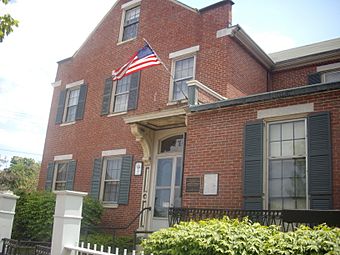Neal Dow House facts for kids
|
Neal Dow House
|
|

Pictured in 2008
|
|
| Location | 714 Congress St., Portland, Maine |
|---|---|
| Area | less than one acre |
| Built | 1830 |
| Architectural style | Federal |
| NRHP reference No. | 73000236 |
Quick facts for kids Significant dates |
|
| Added to NRHP | April 11, 1973 |
| Designated NHL | May 30, 1974 |
The Neal Dow House is a special historic home located at 714 Congress Street in Portland, Maine. It was built in 1829 for a famous politician named Neal Dow (1804–1897). This house is recognized as a National Historic Landmark because of its connection to him.
Neal Dow was a strong supporter of the temperance movement. This movement encouraged people to drink less or no alcohol. He even wrote the first law in Maine in 1851 that tried to stop the sale of alcohol. These types of laws became known as "Maine laws." Dow was a well-known activist who worked hard to spread his message around the world. His house was a busy place for these activities. Today, it is the main office for the Maine chapter of the Women's Christian Temperance Union, a group that continues to promote healthy living.
Contents
Exploring the Neal Dow House
The Neal Dow House is a large, two-and-a-half-story building made of brick. It has 17 rooms and shows off a style called "late Federal." This style was popular in the United States during the early 1800s. The house has a rectangular shape with three main parts.
How the House is Designed
The main part of the house stands on a corner lot. It is two-and-a-half stories tall and has three sections on its front. A smaller, two-and-a-half-story section extends from the back of the main part. There is also a one-story section with a flat roof that connects these two taller parts, forming an "L" shape. The main door is on the right side of the front section. It has a fancy, decorative cover from the late Victorian period.
A Home for Many Years
The house was built in 1829 when Neal Dow married Maria Maynard. It was his home for 67 years, until he passed away at the age of 93 in 1897. Later, Dow's son, Fred, gave the house to the local chapter of the Women's Christian Temperance Union. He also donated many of his father's belongings and historical items. After a period of less activity, efforts began in 2013 to make the chapter more active again. You can visit the house for free on weekdays or by making an appointment.
Neal Dow's Important Life
Neal Dow grew up in Portland with Quaker parents. He was a successful local businessman and an early supporter of the temperance movement. In 1829, he started the Maine Temperance Union. He began speaking publicly about completely stopping the sale of alcohol.
Becoming Mayor and Making Laws
In 1851, Neal Dow was elected mayor of Portland. As mayor, he quickly pushed for a statewide law to stop the sale of alcohol, which he had written himself. This law passed, making Dow famous across the country. Similar laws in other states were then called "Maine laws." He traveled widely, giving speeches about his cause.
Service During the Civil War
During the American Civil War, Dow joined the Union Army. He rose to the rank of brigadier general, which is a high military position. After the war, he continued his work for the temperance movement. He even visited England to work with temperance supporters there.
A Presidential Candidate
In the 1880 United States presidential election, Neal Dow ran for president. He was a candidate for the Prohibition Party, a political party that wanted to ban alcohol. He received about 10,000 votes. Dow remained active in his cause until he passed away. Historians say that Dow's ideas and methods helped future temperance advocates.
A Recognized Landmark
The Neal Dow House was added to the National Register of Historic Places in 1973. The next year, it was named a National Historic Landmark. This means it is a very important place in American history.
Images for kids
See also
 | John T. Biggers |
 | Thomas Blackshear |
 | Mark Bradford |
 | Beverly Buchanan |




